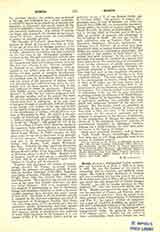

Biondo, FLAVIO, a distinguished Italian archaeologist and historian, b. at Forli in 1388; d. at Rome in 1463. He was the founder of the science of archaeology and of Christian and medieval topography. He studied under Ballistario of Cremona and was remarkable for learning even in his youth. He lived for some time at Milan, where he discovered and copied the only manuscript of Cicero’s dialogue “Brutus”. In 1432 he became secretary to Pope Eugenius IV, who was afterwards driven out of Rome. Biondo accompanied the pope in his exile, was his secretary at Ferrara and Florence, and returned to Rome with him. Later he served in the same capacity under Popes Nicholas V, Calixtus III, and Pius II. An earnest student of antiquities and a man of wonderful erudition, he applied himself with indefatigable industry to the task of collecting materials for his historical, archaeological, and topographical works. He gathered his materials from original sources. Biondo was the author of three encyclopaedias, which have formed the basis of all subsequent dictionaries of Roman archaeology and antiquities. His works, which were edited after his death by his sons, include: “Roma Instauratae Libri Tres” (1482), dedicated to Pope Eugenius IV, a valuable study of the ancient monuments of Rome, the first attempt at a topographical description of the city, giving also a complete list of the principal Christian churches and chapels, when and by whom built, etc.; “Roma Triumphantis Libri Decem” (1482), dedicated to Pius II, a study of the institutions and customs of the ancient Romans; “Italia Illustrata” (1474), a description of Italy in fourteen regions, with an accurate list of the cities, etc. Biondo’s historical researches bore fruit in a great work entitled “Historiarum ab Inclination Romanorum Imperii, Decades III, Libri XXXI” (Venice, 1483), covering the period from the fall of the Roman Empire to the author’s own time (1440). The work was divided into decades, but Biondo’s death prevented him from completing the vast undertaking after he had written three decades and the first book of the fourth.
EDMUND BURKE

